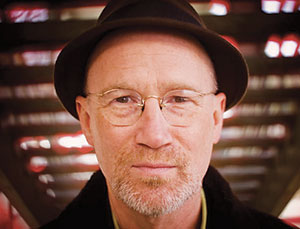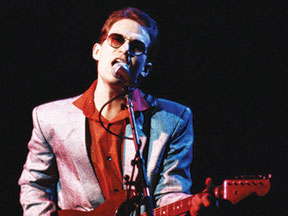
Master songsmith Marshall Crenshaw will be entertaining the crowd at Johnny D’s on Thursday, May 22.
By Blake Maddux
As is the case with most musicians who sustain a three-decade long career despite not becoming superstars, many people would recognize Marshall Crenshaw’s work even if his name does not register with them.
Crenshaw’s 1982 hit Someday, Someway, his lone Top 40 entry, has appeared in productions as varied as the 1985 Madonna movie Desperately Seeking Susan and a 2005 episode of The West Wing. Other songs that he has written can be heard in Superman III, Empire Records, Walk Hard: The Dewey Cox Story, and Baby Mama.
In 1987, Crenshaw portrayed Buddy Holly in the film La Bamba. This made sense, as he had sort of been playing his fellow bespectacled rocker on record for the previous half decade. Before he recorded his eponymous debut album, he had appeared on stage as John Lennon in Beatlemania.
A longtime Big Apple resident who was born and raised in the Motor City, Crenshaw was an honoree at the 23rd Annual Detroit Music Awards on April 25 of this year.
Crenshaw will be performing at Johnny D’s on Thursday, May 22. He spoke to The Somerville Times by phone from a studio called Hobo Sound, which is located one town over from Hoboken, New Jersey.
Somerville Times: Was there ever any chance of you not going into showbiz?
Marshall Crenshaw: I always had my mind set on the idea of playing rock ‘n’ roll music. That was the most appealing thing around me as a kid. It grabbed hold of me and I grabbed hold of it.
What’s kind of got me hemming and hawing a little bit is your usage of the term “show business,” which I use all the time, too. I have mixed feelings about show business, but the music always was the thing that I was going to follow. I sort of decided on that early in life. Show business is something that I’m not so sure I like still. But I like making the music.
ST: So there was never any threat of you having at 9-to-5 office job?
MC: No. I was like a really cranky kid, and I hated authority figures and I was alienated by the adult world. As a kid I was determined not to go down that kind of road. It’s funny that I’m still acting on this decision that I made as a kid.
ST: How did you meet up with the Gin Blossoms to co-write Til I Hear It From You for the Empire Records (1995) soundtrack?
MC: The Gin Blossoms already knew that they were going to have a song in the movie soundtrack before we even wrote it. There was already a reason to write the song, and that’s a big part of the equation right there. And as soon as it came out it was an instant smash hit, so that was kind of nice.

A younger Crenshaw.
One of the members of the band, his name is Jesse Valenzuela, just kind of sought me out. I’d heard about them earlier I was down in Nashville one time at a place called the Exit Inn watching a band called Will & The Bushmen. And while I was trying to concentrate on them, there was this woman that I knew and she was like screaming in my ear. I didn’t want her screaming in my ear, but she was, and she was telling me about this band from Arizona that she managed called the Gin Blossoms, and that they love you, they worship you. And I thought, “God I wish you’d go away.”
Soon after that she shot me an album in the mail, and it was an album that they had just made themselves to sell at their gigs or whatever. Then about two years later, they had a smash hit with their debut album on A&M. Then I met Jesse and he said, “We gotta write a song together.” And I said, “Well are you going to be at South By Southwest this year?” and he said, “Yeah.”
So we wrote Til I Hear It From You at South By Southwest. It took about twenty minutes. Then the singer wrote the lyrics afterward. I didn’t even meet the singer in the band until after the record was already in the charts. (laughs)
ST: What about the title song to Walk Hard (2007)?
MC: That was very much a whole, kind of opposite of the Gin Blossoms thing.
I got asked to write a song, one called Take My Hand. That was the first one that I took a crack at. I wrote it and I thought, like I always do think when I finish something, “I nailed it. I got it.”
They called me back, and they didn’t tell me that they were going to use a different version of Take My Hand. They just said, “Why don’t you take a crack at the theme song?” So I wrote the theme song, and from what I understand from other people that also worked the movie, they had like 75 other songs called Walk Hard. My friend Dan Bern told me that he wrote like five different ones called Walk Hard. They got mine, and then they tried and tried and tried and tried to beat it, and nobody could. So I’m kind of proud of that. And they were all really good songwriters, too, everybody who worked on that thing. Mine just managed to hang in there through all that, so I’m happy about that.
ST: I have heard Whenever You’re On My Mind (from the 1983 album Field Day) twice in the past five days, once at Lowe’s and once on the radio. Is that the song of yours that gets the most airplay?
MC: I don’t think it is, actually, but it’s one of the ones that gets some. It kind of varies from year to year or era to era. I used to read my royalty statements. I really don’t read them any more, but there was a time when Mary Anne was really the biggest thing on my statement because it was used on some music service.
But the one that just keeps hanging in there year after year is You’re My Favorite Waste of Time, which was a hit record in Europe for this guy [Owen Paul]. It’s an awful record, but it was a smash in England and all over Europe, so I still get a nice chunk of change every year for that song. Not enough so I can just sit at home and do nothing, but every year I get some decent amount of money for that song.
If something was really cool, some really cool news happened, just to make it memorable [my publisher] would send me a telegram. And he sent me one: “‘You’re My Favorite Waste of Time’ by Owen Paul number 15 on the UK singles chart this week.” I didn’t know anything about it. Didn’t know that anybody had recorded it. Didn’t know anything.
And then the next week I got another telegram, and it was number 8. Then the week after that it was number 3, then number 2. I kept getting these telegrams every week, and it was fun, you know. It was great. It was right around the same time as La Bamba, so it was sort of like a convergence of events.
ST: Has living in Detroit and New York City had a particularly profound influence on you?
MC: Both, definitely. Growing up in the Detroit area, I lived there till I was 23, and I still have a great deal of love for it. The musical legacy of the city and region of Detroit is a pretty monumental thing. During my lifetime it was especially stellar, I think.
So I grew up on that, and then New York, when I got there, that was a life-changer. I didn’t seek to end up there, but I was just kind of drifting around the country and I wound up in New York. The first day I was there, and I was with my wife, I was like, “I am staying here. I’m staying here forever.” My life started to work. My dreams started to come true. I wound up in the right place and the right things happened, you know.
I’ve now lived away from Detroit for far longer than I lived there, but it still kind of stays on my mind. It’s a very complicated place and I have complicated feelings about it, but one of those feelings is love.
ST: You first appeared on Late Night with David Letterman in 1982, the first year that Letterman hosted the show. How do you feel about his decision to retire?
MC: There are a lot of things about being the age that I am that I am kind of struggling with. I was really happy all during my fifties. I really liked that part of my life, but now I feel – I hate to say this – like I’ve begun a downward arc of sorts. I don’t like feeling this way, but as far as him retiring, unfortunately I do think it’s time for him to do that.
It’s going to be sad to see him go, but the morning he announced his retirement I predicted to my wife that Stephen Colbert would replace him. I just had this gut feeling. I just thought that he would be a more-than-worthy successor to David Letterman, somebody who’s just as much of an innovator and as much of a television genius as Letterman is.
Marshall Crenshaw with Cliff Hillis. Johnny D’s Uptown Restaurant and Music Club. Thursday, May 22, 7:30 PM (Doors at 5:30). $20.

















Reader Comments